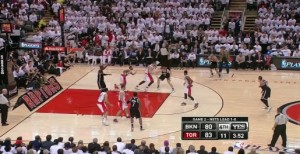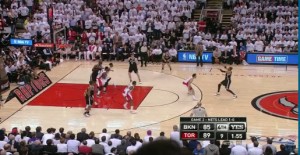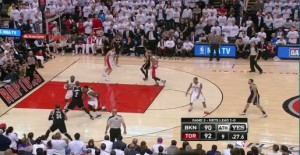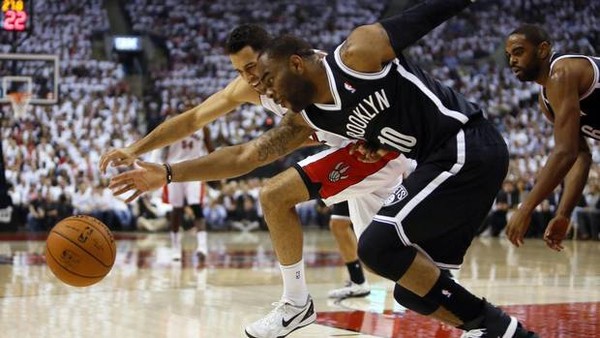Unedited Reaction Podcast – Quick Reaction – Recap – Box – Raptors 100, Nets 95, Series Tied 1-1
Landry Fields played in just 30 games during the regular season, accumulating 322 minutes on the floor. Some of that was due to a nagging wrist injury that required surgery, but he was cleared right around the All-Star break. Aside from a 25-minute outing against Golden State on March 2, Fields played double-digit minutes just once – against Orlando, no less – from Dec. 11 onward. On Tuesday night, he played 18 minutes in a playoff game, including the final six minutes of the game, which was a one-possession affair nearly that entire time.
It was a risky call by head coach Dwane Casey, who cut his rotation from 12 players in Game 1 to just eight in Game 2, gluing Tyler Hansbrough, Chuck Hayes, Steve Novak, Nando De Colo and John Salmons to the bench and dusting Fields off after a DNP-CD in the series opener. Salmons has reportedly been dealing with a sore back, but the decision to break the glass on Fields was due to the match-up problems apparent in Game 1.
Namely, that DeMar DeRozan can’t seem to guard anyone. As much as we highlighted his fourth-quarter heroics in the post-game recap, it has to be noted that DeRozan has been torched by Joe Johnson in this series, with Johnson scoring at will when checked by DeRozan. The Nets even attacked DeRozan with Alan Anderson on Tuesday.
The adjustment options aren’t obvious or ideal. Put DeRozan on Shaun Livingston and risk being beaten on post-ups while also forcing Greivis Vasquez to guard someone other than his ideal check in Livingston. DeRozan simply can’t guard Deron Williams and would be bullied by Paul Pierce, leaving Johnson as his man with most lineup iterations. DeRozan can check an Anderson or a Marcus Thornton, or even an Andrei Kirilenko it seemed, but the four Nets who would give DeRozan problems played 11 minutes together, and the three in particular that he’d potentially guard played 18 minutes together. DeRozan can’t simply be benched because the team needs his scoring, and so there’s usually a mismatch for the Nets.
In Game 1, the Raptors lived with that, occasionally crossing to have Terrence Ross or Salmons guard Johnson, though they weren’t particularly successful either.
Paul Pierce represents a slightly smaller problem, as he can pull Amir Johnson out of the post and leave the team’s help defense thin. Amir Johnson and Patrick Patterson have done an acceptable job on Pierce save for a couple of hot minutes late in Game 1 and one major slip up at the end of Game 2 (Pierce missed a wide-open three), and they’ll pretty much have to – the team can ill afford to lose Jonas Valanciunas’ post scoring and rebounding for long stretches, and you’d rather have Johnson or Patterson at a slight defensive mismatch than force Ross to the four or use Salmons in that role.
With Kyle Lowry doing a strong job on Williams and Kevin Garnett being less of an offensive presence than in the past, the defensive questions are who checks Johnson, Pierce and whoever the additional close-out player is, usually Livingston but on Tuesday, Kirilenko (late in the season it was usually Livingston in “clutch” situations).
The Raptors don’t really have a versatile wing defender who can be relied on to consistently check the “hot hand.” They have Ross, who has shown flashes of being very good but who is also susceptible to long lapses, Salmons, who rarely makes mistakes but isn’t exactly a stopper, and Fields, who has a solid defensive reputation but barely played all season. Fields’ reputation is hard to quantify, as it is for any defender, but stats from SynergySports show him as being fairly average in the four primary situations he’s been put it (the final column is where his career mark would rank this season, roughly):
| Fields Defense | 2013-14 | 2012-13 | 2011-12 | 2010-11 | TOTAL | |
|---|---|---|---|---|---|---|
| Minutes | 322 | 1037 | 1894 | 2541 | 5794 | |
| ISO PPP | 0.83 | 0.83 | 0.83 | 0.83 | 0.83 | 150 |
| # Isos | 24 | 78 | 108 | 153 | 363 | |
| PnR PPP | 0.48 | 0.75 | 0.92 | 0.81 | 0.82 | 140 |
| # PnR Handler | 21 | 60 | 128 | 156 | 365 | |
| PostUp PPP | 0.89 | 0.94 | 1.04 | 0.99 | 0.98 | 215 |
| # PostUps | 9 | 64 | 57 | 77 | 207 | |
| SpotUp PPP | 1.35 | 0.93 | 0.96 | 1.04 | 1.01 | 200 |
| # SpotUps | 37 | 115 | 190 | 245 | 587 |
But again, these classifications aren’t perfect, and it doesn’t matter so much what Fields has done in the aggregate as what he can do in the present, given the match-up. Fields brings benefits on the defensive end: he’s intelligent, he sees angles well, and he has a good mix of size and lateral quickness, though he’s not elite in either regard.
Tasked with guarding the huge-for-a-two Johnson (6-foot-7, 240-pounds), the 6-foot-7, 215-pound Fields is giving up some weight on post-ups, but not as much as Ross or Salmons would be. He’s also more capable of switching onto Pierce should the Nets action call for it, and would be a safer bet on Williams than DeRozan.
The end result was that in Fields’ 18 minutes, the Nets scored just 87.9 points per 100 possessions, compared with the 107.7 mark they’ve posted in this series when Fields has been on the bench. We won’t credit Fields for the team’s offensive improvement in those minutes, too, as he took zero shots, but he did grab an offensive rebound, dish a dime and secure two steals, one of which led to Patterson being fouled in transition.
So what exactly did Fields do, specifically in the game’s final six minutes? As I rewatched the game, I took notes on Fields’ usage down the stretch:
5:55 – Johnson posts Fields far from the basket on the left side and pushes off to get to the high left block, only to be met by Valanciunas showing double. Johnson then dished to Williams, who lost the handle on a spin move.
5:13 – Johnson and Williams run a pick-and-roll above the left elbow and Fields shows onto Williams but quickly recovers on Johnson, who receives the ball at the elbow but stumbles beyond the arc. Johnson does one quick crossover and pulls up for three with five seconds on the shot clock, but Fields gets a piece.

4:35 – On Johnson, not involved (a bit late on the help on a Kirilenko dunk but it would have meant leaving Johnson in corner).
4:10 – On Kirilenko in transition, not involved. Nets rebound. Shows help off Kirilenko on a Williams drive attempt. Leaves Kirilenko to zone up between Johnson and Garnett, but somebody missed an assignment here because Williams is wide open. Fields is switched onto Garnett and is not involved in the final shot, a Pierce pull-up.
 3:15 – On Johnson again, can’t stray too far from the corner to help on Garnett, who dives for an easy dunk.
3:15 – On Johnson again, can’t stray too far from the corner to help on Garnett, who dives for an easy dunk.
2:40 – On Johnson in transition, not involved.
2:10 – On Johnson, switches onto Williams after pick-and-roll, then switches onto Pierce. Again there seems to be a miscommunication (DeRozan appears the guilty party), as Williams gets open but misses. Fields then gets called for a loose ball foul on Garnett on the rebound.
 1:20 – On Johnson, quickly switches onto Williams during a pick-and-roll and then gets back to Johnson at the left elbow. Williams tries to feed Johnson to establish a high post but Fields taps the pass out to Lowry.
1:20 – On Johnson, quickly switches onto Williams during a pick-and-roll and then gets back to Johnson at the left elbow. Williams tries to feed Johnson to establish a high post but Fields taps the pass out to Lowry.

1:05 – On Johnson, not involved.
0:33 – On Johnson, follows through a screen and fronts the post-up, and Livingston looks elsewhere. Fields wasn’t involved on the final shot, but how scary was this?

0:21 – On Johnson, runs into a Garnett screen on the inbounds, allowing Johnson to get free for an easy layup.

0:16 – On Johnson on inbound play, not involved.
0:11 – On Johnson in transition, not involved.
0:07 – On Johnson in transition, jumps on loose ball when Johnson fumbles the pass.

There’s not a whole lot there that Fields did exceptionally. The two steals were huge, of course, as was getting a piece of Johnson’s 3-pointer. Perhaps just as important is that Fields rarely lost Johnson or allowed him to establish strong position, and he and Lowry communicated well in pick-and-roll situations. More than Fields doing anything that stood out, he played mistake-free defense, except for the one inbound play (here’s where the commenters point out Garnett’s screen).
And, of course, the Nets looked to Johnson less often, with him taking just two attempts in those six minutes compared to, say, five in the first 10 minutes of each half, primarily with DeRozan on him.
For one night, this looked like it may be the answer, as much as there’s an answer for a player as talented as Joe Johnson. Limiting clean looks and denying post position are really all you can do one-on-one, and the Nets are simply too talented and too balanced to double anyone, anywhere. I’d guess Casey comes back with Fields as the first wing off the bench in Game 3, but I’d likewise expect the Nets to adjust, possibly finding ways to move Johnson around more and force switches, or just by feeding him constantly when DeRozan is the check, as they did Tuesday.
As we’re learning, the playoffs are as much about anticipating opponent adjustments as they are making adjustments of your own. The Nets expect Fields as a primary defender now, and they have several very talented offensive players who surely have ideas on how to work him. It’s anything but a checkmate, but it represents a nice first adjustment, and one that shows Casey is willing to be flexible and break his late-season rotation mold to gain an edge.
As for Fields himself, well, way to stay ready. He’s a very smart guy, one who probably benefits more than most from the cerebral nature of a playoff series. The contract is bad and this season a complete waste, but he was ready when his number was called and came through in a huge situation. Here’s hoping it’s the first step in a 2014-15 resurgence of sorts.



